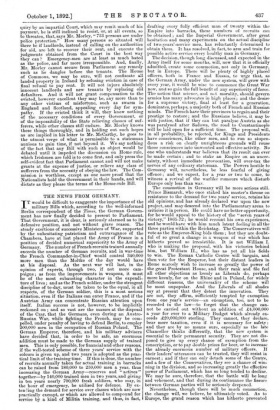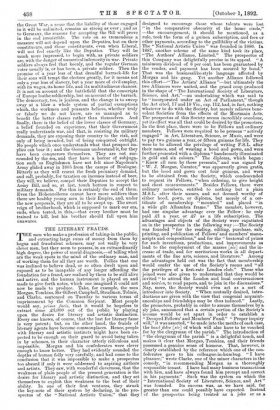THE NEWS FROM GERMANY.
IT would be difficult to exaggerate the importance of the military Bills which, according to the well-informed Berlin correspondent of the Times, the German Govern- ment has now finally decided to present to Parliament. That Government, it is clear, is seriously alarmed as to its defensive position, and not without grave reason. The steady exertions of successive Ministers of War, supported by the unhesitating patriotism and extravagance of the Chambers, have at last placed the Army of France in a position of decided numerical superiority to the Army of Germany. The number of French recruits trained annually exceeds the number of German recruits, and in war-time the French Commander-in-Chief would control 340,000 more men than the Moltke of the day would have at his disposal. As the next war will last, in the opinion of experts, through two, if not more cam- paigns ; as from the improvements in weapons, it must be of the most exhausting character in the expendi- ture of lives ; and as the French soldier, under the stringent discipline of to-day, must be taken to be the equal, in all respects, of the German soldier, this is a most serious situation, even if the Italians can enter France, and if the Austrian Army can concentrate Russian attention upon itself. Italian success is not, however, to be implicitly reckoned on ; and so vast are the masses at the disposal of the Czar, that the Germans, even during an Austro- Russian War, while fighting the French, may be com- pelled, under penalty of having to defend Berlin, to employ 200,000 men in the occupation of Russian Poland. The German Emperor, therefore, and his military advisers have decided that, in order to be safe, an enormous addition must be made to the German supply of trained men. This is only possible, for financial and other reasons, if the well-tested scheme of three years' service with the colours is given up, and two years is adopted as the prac- tical limit of the training time. If this is done, the number of recruits annually taken for actual training in barracks can be raised from 180,000 to 250,000 men a year, thus increasing the German Army—reserves and " actives " together—by 140,000 trained men in two years, and giving in ten years nearly 700,000 fresh soldiers, who may, in the hour of emergency, be utilised for defence. By ex- tending the demand for service over classes which are now practically exempt, or which are allowed to compound for service by a kind. of Militia training, and thus, in fact, drafting every fully efficient man of twenty within the Empire into barracks, these numbers of recruits can be obtained ; and the Imperial Government, after great hesitation and many experiments on the actual discipline of two-years'-service men, has reluctantly determined to obtain them. It has resolved, in fact, to arm and train for possible active service every healthy man in Germany.
The decision, though long discussed, and expected in the Army itself for some months, will, now that it is officially admitted, create some commotion, not only in Germany, but in Europe. There will be plenty of highly placed officers, both in France and Russia, to urge that, as the German Army, under the new system, will grow with every year, it would be wise to commence the Great War now, and so gain the full benefit of any superiority of force. The notion that science, and not morality, should govern armies has many advocates in high places ; and the desire for a supreme victory, final at least for a generation, dominates, perhaps, a majority both of French and Russian minds. The French have their provinces to regain and their prestige to restore ; and the Russians believe, it may be with justice, that if they can but paralyse Austria as she was paralysed after Sadowa, the road to Constantinople will be laid open for a sufficient time. The proposal will, in all probability, be rejected, for Kings and Presidents have consciences, like other men, and to run so stupen- dous a risk on clearly unrighteous grounds will rouse those consciences into unwonted and effective activity. No one who understands war believes that its result can ever be made certain ; and to stake an Empire on an uncer- tainty, without immediate provocation, will over-tax the nerves of any ordinary statesman. The Powers hostile to Germany will, nevertheless, be less fearful of giving offence ; and we expect, for a year or two to come, to witness a revival of the warlike rumours which disturb Europe only less than war.
The commotion in Germany will be more serious still. Prince Bismarck, who once staked his master's throne on resistance to the demand for two years' service, retains his old opinions, and has already declared war upon the new project, and may descend into the Parliamentary arena to criticise it in person. He could have no better opportunity, for he would appeal to the history of the " seven years of victory," 1865-72 ; he would recount his own experiences, and he would have with him much latent feeling in all the three parties within the Reichstag. The Conservatives will vote as the Emperor-King bids them ; but they are doubt- ful of so great a change in a weapon of war which has hitherto proved so irresistible. It is not William I. who is making the proposal, with his victories behind him, but William II., who has as yet all his fields- to win. The Roman Catholic Centre will bargain, and then vote for the Emperor, but their distant leaders in Rome scarcely wish to increase so greatly the power of the great Protestant House, and their rank and file feel all other objections as keenly as Liberals do, perhaps more keenly, for on the Rhine and in Poland, for widely different reasons, the universality of the scheme will be most unpopular. And the Liberals of all shades say at present that they detest the innovation. They are not, they affirm, sufficiently tempted by exemption_ from one year's service—an exemption, too, not to be recorded in the law—to forget that the change can- not be carried out without an addition of £4,000,000 a year for ever to a Military Budget which already ex- ceeds £20,000,000 sterling. They cannot, they declare, bear more taxation, even if it is necessary for safety ; and they are by no means sure, especially as the late Chancellor thinks differently, that the new system is essential to their permanent security. They are not dis- posed to give up every chance of exemption from the conscription, or to pay double prices for beer, or to increase the already enormous number of military officers. If their leaders' utterances can be trusted, they will resist in earnest ; and if they can only detach some of the Centre, and a few of the Conservatives, they see a chance of win. ning in the division, and so increasing greatly the effective power of Parliament, which has so long tended to decline. We may be sure, therefore, that the battle will be long and vehement, and that during its continuance the fissure between German parties will be seriously deepened.
Nevertheless, though there will be much commotion, the change will, we believe, be ultimately voted. As to Europe, the grand reason which has hitherto prevented the Great War, a sense that the liability of those engaged in it will be unlimited, remains as strong as ever ; and as to Germany, the reasons for accepting the Bill will prove in the end irresistible. The vote on so tremendous a measure will not depend upon the Deputies, but on their constituents, and those constituents, even when Liberal, will not feel exactly like the Deputies. They will be much more impressed, to begin with, as private soldiers are, with the danger of numerical inferiority in war. Private soldiers always feel that keenly, and the regular German voter usually is, or has been, a private soldier. Then the promise of a year less of that dreadful barrack-life for their sons will tempt the electors greatly, for it means not only a year less of slavery, but a year more of civil employ, with its wages, its home life, and its multitudinous chances. It is not on account of the battlefield that the conscripts of Europe loathe soldiership, but on account of the barrack. The democracy, too, is jealous, and the change is to sweep away at a blow a whole system of partial exemptions which, the workmen and peasants believe, whether truly or falsely we do not know, are so managed as to benefit the better classes rather than themselves. And finally, there is the belief of the lower classes of Germany, a. belief founded on experience, that their Government really understands war, and that, in resisting its military demands, they are exposing their country to the risk, not only of being invaded, but of being conquered outright. No people which once understands what that prospect im- plies can bear it ; and the Germans understand it, for they have been conquerors themselves. They are not sur- rounded by the sea, and they have a horror of subjuga- tion such as Englishmen have not felt since Napoleon's Army glided away in 1805 from the camps of Boulogne. Bitterly as they will resent the fresh pecuniary demand, and call, probably, for taxation on incomes instead of beer, they will, we believe, compel their Deputies to accept the Army Bill, and so, at last, touch bottom in respect to military demands. For this is certainly the end of them. Even the Hohenzollerns cannot have more soldiers than there are healthy young men in their Empire, and, under the new proposals, they are all to be swept up. The sweet reign of brotherhood, which is supposed to mark our era, ends, when tested, in this,—that every brother must be trained to kill, lest his brother should fall upon him unawares.



































 Previous page
Previous page